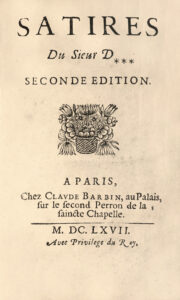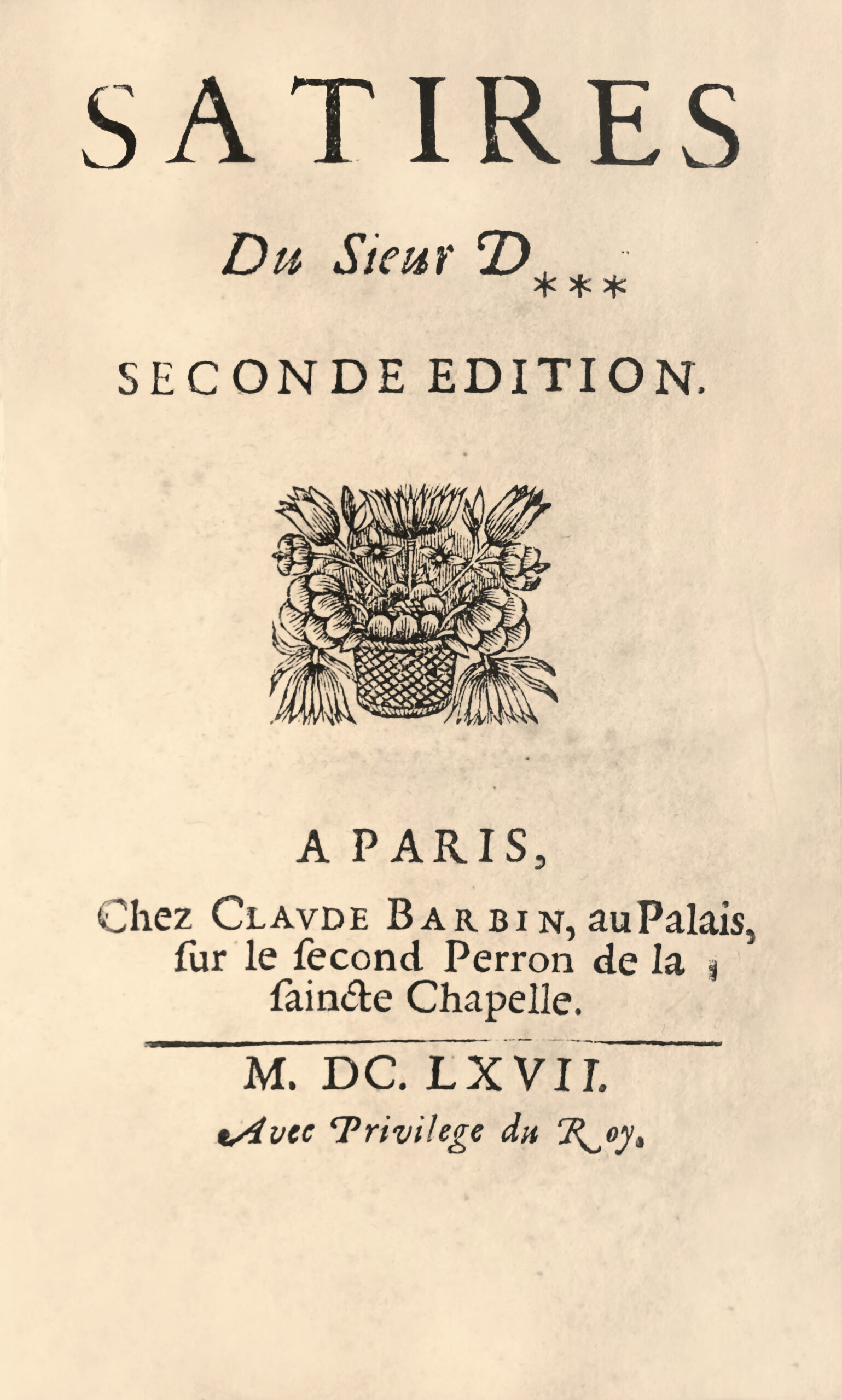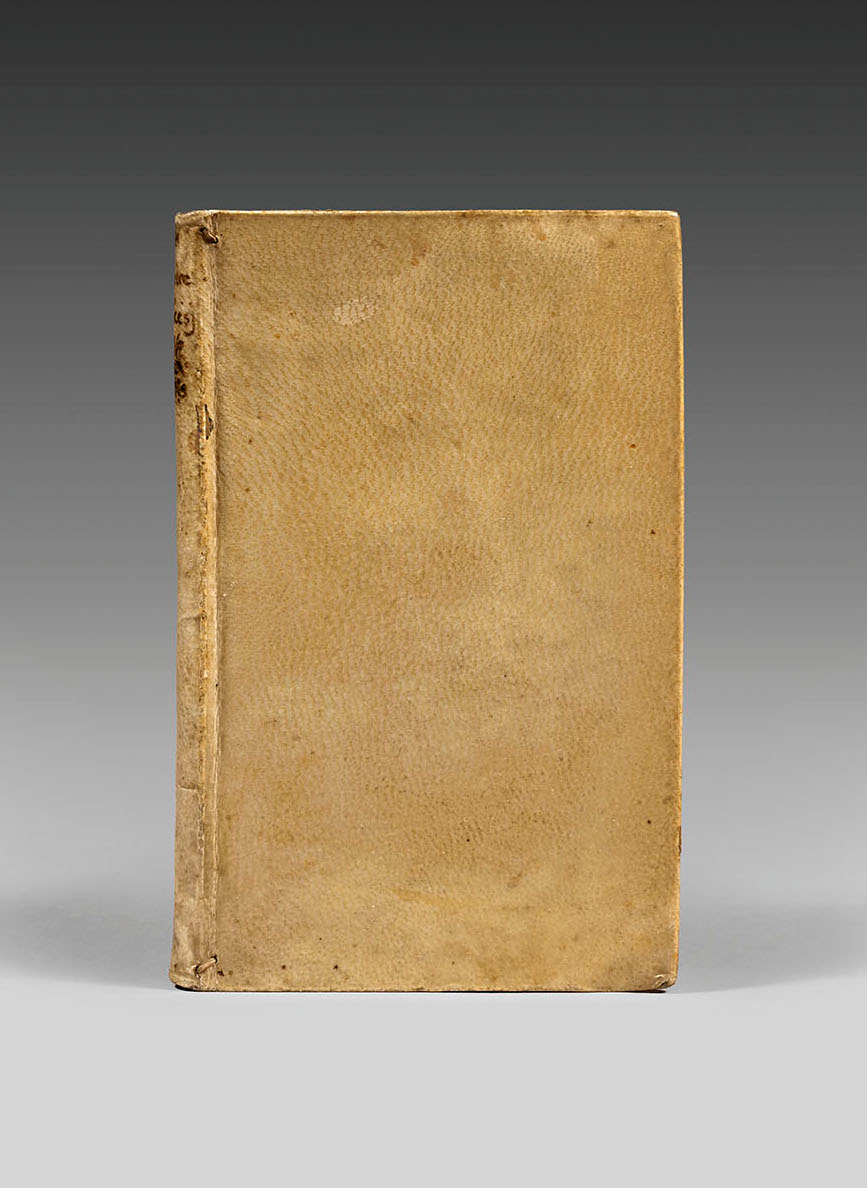Paris, Claude Barbin 1667.
-[Followed by] : Satires du Sieur D. Quatriesme édition.
Paris, Billaine, Thierry, Léonard, Barbin, 1668.
2 works together in 1 volume 12mo : I/ (6) ll. title included, 71 pp. ; II/ (1) l. of title, 14 pp., (1) l. of privilege, (2) white ll. Some ll. burnished. Full contemporary vellum, flat spine with handwritten title at the head. Contemporary binding
140 x 84 mm.
Very rare “first edition of Boileau’s Satire VIII small format”, published simultaneously with the 4to.
Tchemerzine, I, 736.
At the head of the volume the second edition of satires I to VI, “rarer than the original, with the same parts and the same characters, ” the Discourse to the King ” is placed at the beginning as it will be in later editions. The notice to the reader is considerably enlarged.” Tchemerzine, I, 734.
According to Le Petit, the original edition of Satire VIII is often bound after the 2nd edition of the satires.
“By the dates, 1636-1711, Boileau-Despréaux is indeed a man of the Grand siècle. But as early as 1660, he discovered that he was a satirist.
Painting the embarrassments of Paris, mocking ridiculous provincials, giving Chapelain and Quinault a scolding were soon no longer enough for him; and here he was, attacking prevaricating financiers, the indecency of certain judicial “proofs”, the unfortunate customs imported from Italy… There was a great uproar: insults, threats and slanderous denunciations were hurled at this “young madman”, who some were turning into a state criminal. As is only natural, the bad poets were the most eager to retaliate, as they had been attacked more viciously than anyone else.
Their anger amused the aggressor, their threats made him raise his shoulders and their insults made him sit up straight. Proud of his disinterestedness and independence, sure of his right, he placed himself and his work under the aegis of a king who accepted that a tribute was not sycophancy, who was pleased that praise did not necessarily lead to solicitation. (Speech to the King, 1665.) Two years later, in this Satire, which is a masterpiece of light-hearted, ingenious, vigorous and dignified wit, he firmly established the legitimacy of literary satire and the public utility of his enterprise. By denouncing false merits and demolishing usurped reputations, he saved French taste and cleared the way for true poets to build their masterpieces.
“The satires, because they are based on observations of the life and mores of the bourgeoisie of the time, are not lacking in life or accuracy. Without doubt, Boileau can be a very witty realist in “Le Repas ridicule” (Satire III) and “Les embarras de Paris” (Satire VI). But it is in the satires (II, VII) that he appears in his true role; it is through them that we can understand how he was able to clean up the literary world of his time. There is no shortage of attacks on bad poets, and Boileau relentlessly returned to the hated names of Chapelain, Coras, Pradon, de Scudéry and Cotin, attacking them head-on: he ridiculed them, usually with such enormous praise that it provoked irresistible laughter.
It should not be forgotten that at the time the same people who applauded Corneille or the Provinciales were far from insensitive to the insipid madrigals of the précieux, the interminable novels of Mlle de Scudéry, the epic poems of Chapelain et al. These flat authors not only had their public, but they were supported by the booksellers, the great lords and the Académie, and it took some courage to take them on.
“Fortunately for Boileau and the writers he championed, they found a protector, and what a protector, in the person of Louis XIV. He was the king who made Boileau and Racine his historiographers”.
A precious copy from the first issue before the cancels of verses 5 and 6 page 61, preserved in its first vellum binding of the time ; from the illustrious literary library of Guy Pellion with engraved ex-libris.
The flyleaf bears this note in 19th century calligraphy in brown ink: “Second first edition of the first seven satyrs, much rarer than the first. The second part of this copy contains the first edition of satyr VIII”.



